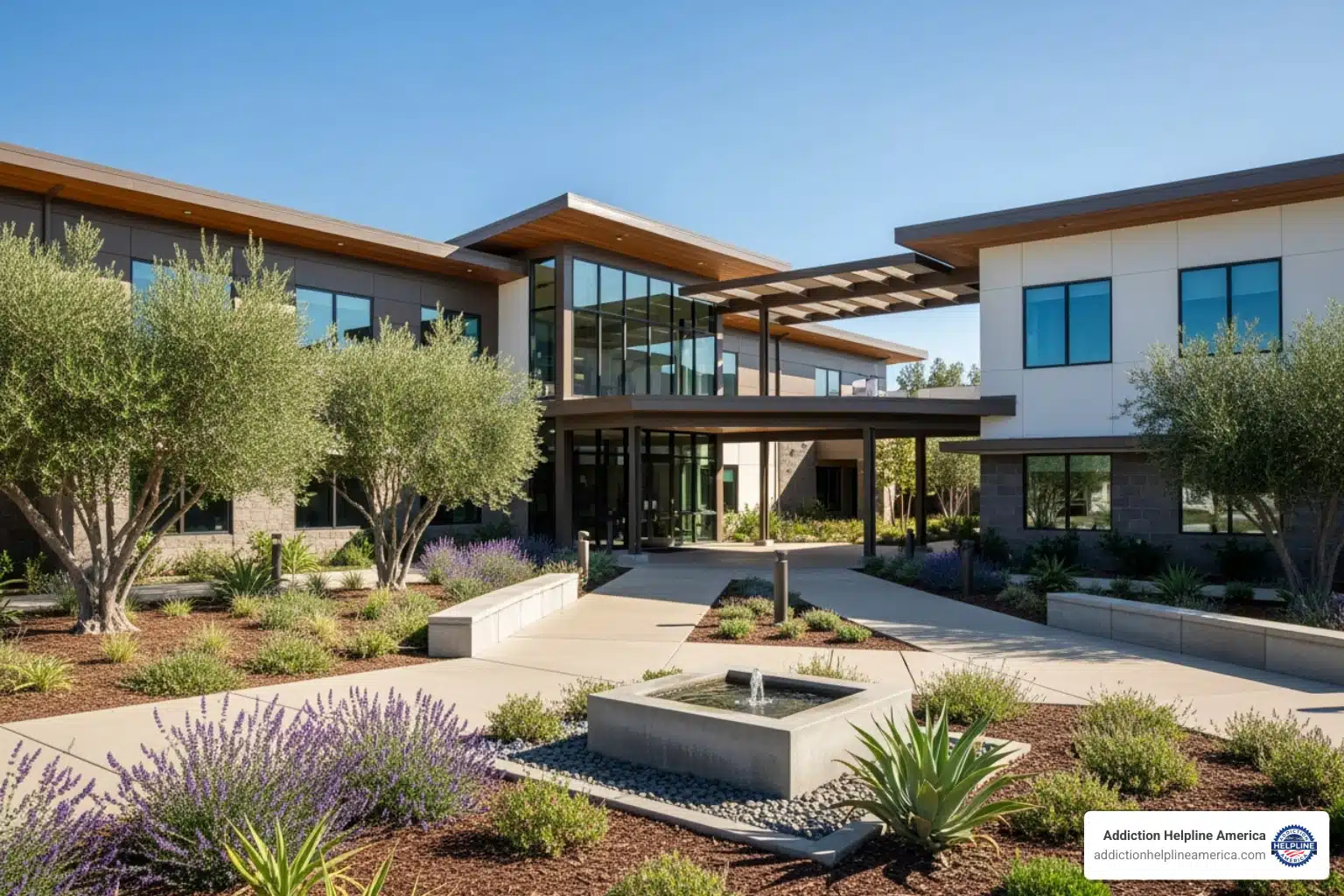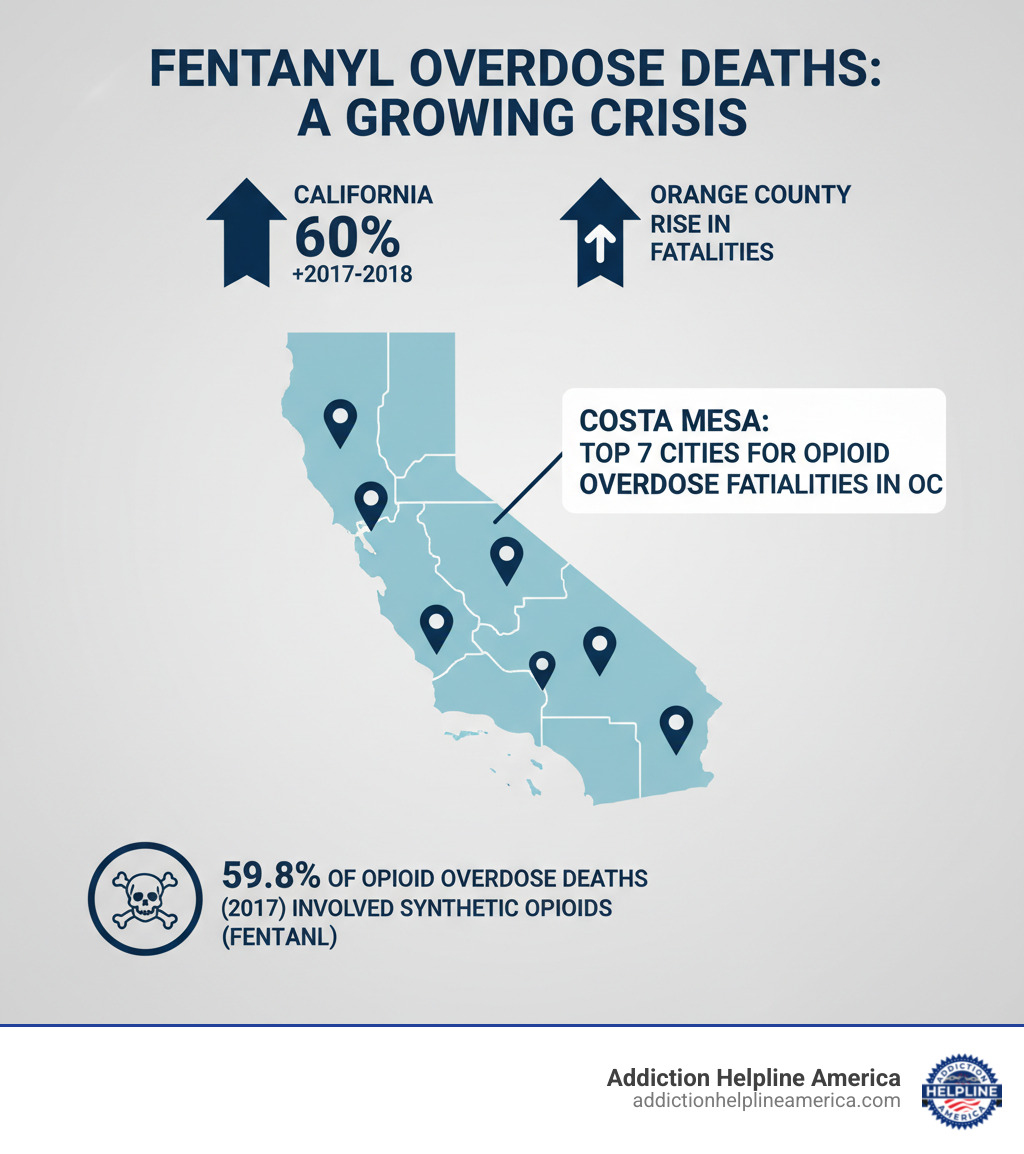
The Urgent Need for Fentanyl Addiction Treatment in Costa Mesa
Fentanyl rehab Costa Mesa offers life-saving treatment for one of the most dangerous opioid crises facing Orange County. If you or a loved one is struggling with fentanyl addiction, here’s what you need to know:
Quick Facts About Fentanyl Rehab in Costa Mesa:
- What it treats: Fentanyl addiction, opioid dependence, and co-occurring mental health disorders.
- Where to find help: Accredited facilities in Costa Mesa and nearby communities.
- Treatment options: Medical detox, inpatient, outpatient, and medication-assisted treatment (MAT).
- Typical duration: 30 to 90 days for initial treatment, plus ongoing aftercare.
- Insurance: Most major insurance plans cover at least part of the cost.
- Available 24/7: Crisis helplines and admissions centers operate around the clock.
Costa Mesa is among the top 7 cities for opioid overdose fatalities in Orange County. Fentanyl, a synthetic opioid 50 to 100 times more potent than morphine, is a primary driver of this crisis. Its extreme strength means even a tiny amount can be fatal. Many users are unaware they’re taking it, as dealers often mix it into other drugs like heroin, cocaine, and counterfeit pills.
Statistics highlight the danger. In 2017, synthetic opioids like fentanyl were involved in nearly 60% of all opioid-related overdose deaths nationwide. In Orange County, over half of opioid-related overdoses involve prescription drugs, and two-thirds of investigated overdose deaths are linked to opioid use.
But there is hope. Recovery is possible with professional treatment. Fentanyl rehab centers in Costa Mesa provide evidence-based care, from medically supervised detox to long-term therapy, to help individuals break free from addiction.
At Addiction Helpline America, we connect individuals and families with the right fentanyl rehab resources. Our addiction specialists offer confidential, compassionate guidance 24/7 to help you steer this difficult time.
Understanding Fentanyl Addiction: Signs, Symptoms, and Dangers
Fentanyl is a powerful synthetic opioid, 50 to 100 times more potent than morphine, originally developed for severe pain management in cancer patients. Classified as a Schedule II drug, it has medical uses but a high potential for abuse. A dose the size of a few grains of salt can be fatal.
Addiction develops rapidly. Fentanyl binds to the brain’s opioid receptors, creating intense euphoria. The brain quickly adapts, building tolerance and dependence, sometimes after only a few uses. Soon, the user needs fentanyl just to feel normal.
Exposure often happens unknowingly. While some people develop dependence from a legitimate prescription, many are exposed to illicit fentanyl. Dealers mix it into heroin, cocaine, and counterfeit pills that mimic medications like Xanax or OxyContin because it’s cheap and potent. This contamination has made Costa Mesa one of the top seven cities for opioid overdose fatalities in Orange County.
Signs and Symptoms of Fentanyl Use
Recognizing the signs of fentanyl use can save a life. Look for a combination of physical and behavioral changes.
Physical Symptoms:
- Constricted, pinpoint pupils
- Extreme drowsiness or “nodding out”
- Slow, shallow breathing
- Nausea, confusion, or slurred speech
- Itchy skin, constipation
- Bruising or puncture marks (if injecting)
Behavioral Changes:
- Sudden mood swings from euphoria to irritability
- Withdrawal from friends and family
- Neglecting work, school, or home responsibilities
- Secretive behavior and financial problems
- Loss of interest in hobbies
- Continued use despite negative consequences
Immediate Risks and Overdose Dangers
The most significant immediate danger of fentanyl is respiratory depression—breathing slows to a stop. This leads to hypoxia, a lack of oxygen to the brain, which can cause permanent brain damage, coma, or death within minutes.
Many overdoses are accidental, often due to counterfeit pills. These pills look identical to real prescription drugs like OxyContin or Xanax but contain lethal, unevenly distributed doses of illicit fentanyl. The user has no idea of the pill’s true strength.
Statistics paint a grim picture. In 2017, synthetic opioids like fentanyl were involved in 59.8% of the 47,600 opioid-involved overdose deaths nationwide. In Orange County, investigated overdose deaths were mostly accidental (78.6%), with 66.8% having a connection to opioid use.
Fortunately, fentanyl rehab Costa Mesa facilities are equipped to treat this addiction safely and effectively. Recovery begins with seeking professional help.
The First Step to Recovery: Medically Supervised Detox
Breaking free from fentanyl addiction starts with medically supervised detox. Attempting to quit “cold turkey” at home is dangerous and rarely successful. Fentanyl withdrawal is painful, and the overwhelming symptoms often lead to a quick relapse. Relapsing after detox is especially dangerous because your tolerance has dropped, making a fatal overdose on a previous dose size highly likely.
Professional detox in a fentanyl rehab Costa Mesa center provides a safe, controlled environment. You receive 24/7 medical monitoring to manage symptoms and prevent complications. Medical staff use medications to ease discomfort, ensuring your safety and making the process more bearable. This supportive setting is crucial for a successful start to recovery.
Common Fentanyl Withdrawal Symptoms
Fentanyl withdrawal is deeply uncomfortable but typically not life-threatening under medical care. As your body rebalances, you can expect symptoms such as:
- Severe muscle and bone pain
- Insomnia and exhaustion
- Diarrhea and vomiting
- Intense cravings
- Severe anxiety, agitation, and depression
- Chills and goosebumps (the origin of “cold turkey”)
- Abdominal cramping and runny nose
Medical supervision helps manage these symptoms effectively.
The Fentanyl Detox Process and Timeline
The detox process is structured to ensure your safety and prepare you for ongoing treatment.
- Initial Assessment: Medical staff evaluate your addiction history, physical and mental health to create a personalized detox plan.
- Stabilization and Medication Management: You’ll receive medications (like buprenorphine) to reduce withdrawal symptoms and cravings, along with other comfort measures to manage specific issues like nausea or anxiety. The goal is to safely clear fentanyl from your system.
- Transition to Rehab: The acute detox phase typically lasts a few days to a week. Afterward, you transition seamlessly into a comprehensive rehab program. Detox addresses the physical dependence; rehab addresses the psychological roots of addiction, which is vital for long-term recovery.
Addiction Helpline America can help you find the right detox and treatment program, providing compassionate guidance for this critical first step.
Choosing a Top Fentanyl Rehab in Costa Mesa: A Comprehensive Guide
Choosing the right fentanyl rehab Costa Mesa facility is a critical step. When evaluating programs, look for these key features:
- A Continuum of Care: Facilities should offer various levels of care (inpatient, outpatient, etc.) to match your changing needs.
- Individualized Treatment: Avoid one-size-fits-all programs. Quality care involves a personalized plan based on your unique history and goals.
- Accreditation and Licensing: Ensure the facility is licensed by California and accredited by bodies like The Joint Commission or CARF, which signifies high standards of care.
- Qualified Staff: The team should include licensed medical doctors, therapists, and addiction counselors.
- Evidence-Based Therapies: The program should use scientifically proven methods like CBT, DBT, and MAT, often complemented by holistic approaches like yoga or art therapy.
Key Treatment Programs for Fentanyl Addiction
Quality rehabs offer different levels of care to meet you where you are.
- Inpatient Residential Rehab: You live at the facility 24/7 in a structured, trigger-free environment. This is the most intensive level of care, ideal for severe addiction or co-occurring disorders. Stays are typically 30, 60, or 90 days.
- Partial Hospitalization Programs (PHP): A step-down from inpatient, you attend treatment for several hours daily but live at home or in sober living. It balances high-level support with gradual reintegration.
- Intensive Outpatient Programs (IOP): A flexible option where you attend therapy for 9-20 hours per week, allowing you to maintain work or family duties. It’s suitable for less severe addiction or as a transition from a higher level of care.
- Outpatient Treatment: The least intensive option, involving regular therapy sessions while living at home. It’s often used for aftercare or for those with mild addiction and strong home support.
For more information on treating opioid addiction, visit our resource page on Fentanyl Addiction Treatment.
Essential Therapeutic and Medical Approaches
Effective programs combine multiple therapies to address the whole person.
- Dual Diagnosis Treatment: Simultaneously treats addiction and co-occurring mental health conditions like depression, anxiety, or PTSD, which often fuel substance use.
- Medication-Assisted Treatment (MAT): Combines FDA-approved medications (like buprenorphine or naltrexone) with therapy to reduce cravings and prevent relapse. MAT is a proven, evidence-based standard of care for opioid addiction.
- Cognitive Behavioral Therapy (CBT): Helps you identify and change negative thought patterns and behaviors related to addiction, teaching practical coping skills.
- Dialectical Behavior Therapy (DBT): Teaches skills in mindfulness, distress tolerance, and emotional regulation, particularly helpful for those with intense emotions or trauma.
- Family Therapy: Heals damaged relationships, improves communication, and helps family members learn how to provide healthy support without enabling.
What to Expect at a Fentanyl Rehab Costa Mesa Facility
Your journey begins with a comprehensive assessment of your medical, psychological, and social history. This allows the team to create a personalized care plan custom to your needs. In a residential program, you’ll follow a structured daily routine including individual and group therapy, educational workshops, and life skills training. Programs also incorporate holistic activities like fitness or meditation. The typical program length is 30 to 90 days, but the ideal duration depends on your specific needs and progress.
Featured Rehab Centers in the Costa Mesa Area
Addiction Helpline America partners with excellent facilities in and around Costa Mesa. Our team can help you find the best fit for your situation. Here are a few examples of the quality care available:
- Clean Path Behavioral Health Costa Mesa CA
- Rising Roads Recovery Costa Mesa California
- Balboa Horizons Treatment Services Costa Mesa CA
- Northbound Treatment Services Behr Center Costa Mesa CA
Navigating these options can be difficult. Our team provides free, confidential guidance 24/7 to help you make the right choice.
Life After Rehab: Building a Foundation for Lasting Sobriety
Completing a fentanyl rehab Costa Mesa program is a major achievement, but it’s the start of a lifelong recovery journey, not the finish line. Aftercare is the support system you build to steer the challenges of daily life without substances.
Without a solid aftercare plan, the risk of relapse is high. The transition from a structured treatment environment back to everyday life can be jarring. A strong plan helps you integrate what you’ve learned, develop a support network, and rebuild your life one day at a time.
Aftercare and Community Support
A comprehensive aftercare plan is your safety net. Key components include:
- Sober Living Homes: These substance-free residences provide a structured, supportive environment with peer accountability, bridging the gap between inpatient rehab and independent living.
- Alumni Programs: Many treatment centers offer programs to keep you connected to the recovery community through events, check-ins, and resources.
- Ongoing Therapy: Individual and group counseling sessions continue to be vital for processing challenges and reinforcing coping skills.
- Support Groups: Costa Mesa and Orange County have numerous free support groups. Narcotics Anonymous (NA) and SMART Recovery offer peer support through in-person and virtual meetings. For families, Al-Anon and Nar-Anon provide crucial guidance and community.
How Family and Loved Ones Can Help
Family support is a powerful factor in successful recovery. If you love someone battling addiction, here’s how you can help effectively:
- Educate Yourself: Understand that addiction is a brain disease, not a moral failing. This fosters compassion over judgment.
- Set Healthy Boundaries: Establish clear rules and consequences regarding substance use. Boundaries protect your well-being and create a structure that supports recovery, not enabling.
- Participate in Family Counseling: Many rehabs offer family therapy to heal relationships, improve communication, and address codependency.
- Offer Encouragement: Acknowledge their hard work and celebrate small victories. Positive reinforcement is a powerful motivator.
- Create a Supportive Home: If they return home, keep the environment substance-free and promote healthy routines.
Support groups like Al-Anon and Nar-Anon are invaluable resources for family members. At Addiction Helpline America, we can also connect your entire family with the resources needed to heal together.
Frequently Asked Questions about Fentanyl Rehab
Navigating the path to recovery brings up many questions. Here are answers to some of the most common ones we hear.
How long does fentanyl rehab last?
The duration of a fentanyl rehab Costa Mesa program is custom to your individual needs. While initial programs often last 30, 60, or 90 days, research shows that longer stays (90 days or more) lead to better long-term outcomes. The length depends on the severity of the addiction, any co-occurring mental health issues, and your progress. Formal treatment is just the beginning; recovery is a lifelong process supported by ongoing aftercare.
Will my insurance cover the cost of fentanyl rehab?
Yes, most PPO insurance plans cover addiction treatment. The Affordable Care Act and mental health parity laws require insurers to provide coverage for substance use disorders. However, the specifics of your coverage—such as deductibles, co-pays, and in-network facilities—depend on your individual plan.
At Addiction Helpline America, we offer free, confidential insurance verification. Our team can clarify your benefits and help you find a facility that maximizes your coverage and minimizes your out-of-pocket costs. Don’t let financial concerns prevent you from seeking help.
What is the difference between inpatient and outpatient rehab?
The main difference is the living arrangement and intensity of care.
-
Inpatient (Residential) Rehab: You live at the facility 24/7, immersed in a highly structured, trigger-free environment. This is best for severe addiction or those needing constant medical and therapeutic support.
-
Outpatient Rehab: You live at home or in a sober living facility and attend treatment sessions at the center for a set number of hours per week. This flexible option allows you to maintain daily responsibilities and is suitable for less severe cases or as a step-down from inpatient care.
Our team can help you determine which level of care is the right fit for your situation.
Take the First Step Towards a New Life Today
If you are reading this, you’ve already taken the courageous first step of acknowledging the problem. Please know that recovery from fentanyl addiction is possible. With professional help, thousands of people reclaim their lives every day.
Fentanyl addiction is a treatable medical condition, but it requires expert care. The evidence-based therapies and compassionate support available at fentanyl rehab Costa Mesa facilities provide a real path to a better future. You do not have to face this alone.
Addiction Helpline America is here to connect you with the right treatment resources. Our service is free, confidential, and available 24/7. We understand that every situation is unique, and we take the time to find the program that best fits your needs from our nationwide network of trusted centers.
We know that reaching out is hard. Concerns about cost, time, and the unknown are normal. Our team is here to answer your questions without judgment and guide you through your options. A single phone call can be the turning point.
Find the right Fentanyl rehab in Costa Mesa for you or a loved one and start building the life you deserve. A future free from fentanyl is within reach. Take that first step today.
Our helpline is 100%
free & confidential
If you or someone you care about is struggling with drug or alcohol addiction, we can help you explore your recovery options. Don’t face this challenge alone—seek support from us.
Programs
Resources
Will my insurance
cover addiction
treatment?
We're ready to help
Find the best
drug or alcohol treatment
center
Are you or a loved one struggling with addiction? Call today to speak to a treatment expert.















